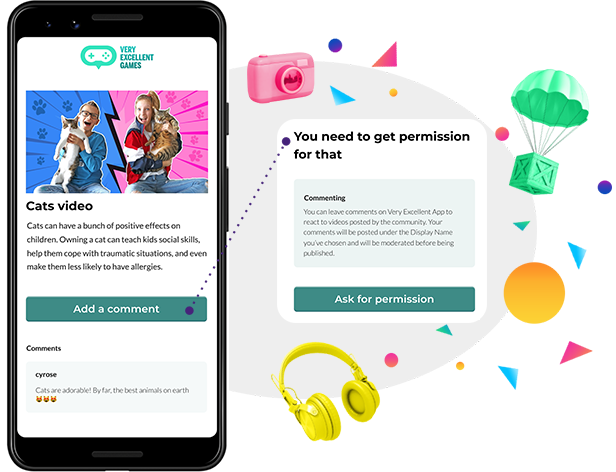
Join gaming leaders on the web at GamesBeat Summit Next this upcoming November 9-10. Learn more about what comes next.
Epic Games and SuperAwesome will make it quick for all game developers to implement no cost parent verification in their video games.
That could sound like a straightforward point to do, but it is increasingly difficult in a world of regulations that govern privacy and other protections for children in an age when everyone is on the web. It indicates the providers will make it quick for developers to embed a method in their games exactly where parents can approve a child’s participation in an on the web space, such as the metaverse, the universe of virtual worlds that are all interconnected, like in novels such as Snow Crash and Ready Player One.
Dylan Collins, CEO of SuperAwesome, which is owned by Epic, stated in an interview with GamesBeat the work will make it much easier for game developers to comply with the laws and regulations that make the world-wide-web safer for kids.
“It also makes it much much easier for parents. Because once a parent is verified, in one of the games that are using our service, when they come into the next game that’s using it, they don’t need to re-verify again,” Collins stated. “If your kid has been playing in Fortnite, and you originally verified the parent, and they come to you and say they want to turn on the services in Among Us, which is also powered by Kids Web Services, you don’t need to go through those same steps as a parent.”
Webinar
Three best investment pros open up about what it requires to get your video game funded.
Watch On Demand
He stated the upcoming metaverse will be a location exactly where folks of varying ages will meet, play games and take element in events just like they do in the physical world, so it is critical that developers have tools to assure they are in a position to provide audience-acceptable experiences that are
compliant with relevant privacy laws.
“All of these experiences are all blending together as we head towards the metaverse,” Collins stated.
For hundreds of thousands of developers about the world, it remains prohibitively high priced to do the appropriate and compliant point for young audiences – particularly when it comes to verifying the identity of parents and guardians.
“It shouldn’t cost developers any money to do the right thing for young audiences,” Collins stated. “Every developer has a different version of this. Every parent has to go through the same verification steps and consent.”
Kids Web Services
SuperAwesome is generating Kids Web Services (KWS) parent verification no cost for all developers globally by means of Epic Online Services. KWS enables developers to confirm the identity of parents or guardians when granting their children permission to use features that gather private info.
KWS currently powers parent verification for some of the most significant games in the world and Epic also lately implemented KWS parent verification into the Epic Games account creation procedure.
“The metaverse will be made up of many types of experiences and will not be controlled by any one company,” stated Tim Sweeney, CEO of Epic Games, in a statement. “This will require all of us who are building toward this future to create experiences that are not only interoperable but also take the safety of our audiences into account, no matter their age. By making KWS parent verification free we hope to enable more developers to create safer digital experiences, while empowering parents to make the choices that are right for their families.”
Making KWS parent verification no cost will also provide a greater user knowledge for each parents and players, Collins stated. Once a parent is verified employing KWS and element of SuperAwesome’s network of verified parents/guardians named the “ParentGraph”, they by no means need to have to provide their verification information once more for any other service that utilizes KWS technologies.
This also minimizes private information processing, considering the fact that the parent or guardian is only supplying their verification information when and SuperAwesome just retains the information vital to allow the ParentGraph.
Companies have to comply with youngster security laws like COPPA in the U.S., the Children’s Code in the United Kingdom and GDPR-K in Europe.
Collins stated we’re seeing tension in the market today. People have an allergic reaction when we speak about kids and technologies, but kids are coming on the web more normally and earlier mainly because of the pandemic. But the tech they’re employing wasn’t designed for them. Many developers do not have the finances or tech chops to address it on their personal.
“This was one of the first things we started to huddle on together after the acquisition closed,” Collins stated. “We joined the Epic family to scale our mission of making the internet safer for kids, but at a level that we just wouldn’t be able to do on our own. We thought how if we could snap our fingers and make that huge problem go away or become much easier.”
Roblox also lately initiated age verification for customers who want to prove they are 13 or older to be in a position to use Roblox’s new spatial audio service which enables voice chat. Each organization has to spend consideration to laws like Europe’s General Data Protection Regulation for kids, or GDPR-K, which limits the information that can be collected on children. In these circumstances, a child’s parent approval will take place and then the identifying info will be discarded soon after the approval is connected with a provided e mail address or login.
There are complexities, of course. Some children could be orphans, or claim to be orphans, and other individuals could have divorced parents, one who approves and one who does not. Collins stated he is glad that we’re even pondering about such queries, compared to 5 years ago when somewhat couple of customers cared about it.
“The entire game development community is starting to think more deeply about this topic than they ever have,” Collins stated. “There are lots and lots of interesting edge cases and permutations here. And we’re continuing to develop this platform and solve for more and more of those on a daily basis.”


/cdn.vox-cdn.com/uploads/chorus_asset/file/25547838/YAKZA_3840_2160_A_Elogo.jpg)

/cdn.vox-cdn.com/uploads/chorus_asset/file/25547226/1242875577.jpg)
/cdn.vox-cdn.com/uploads/chorus_asset/file/25546751/ES601_WEBR_GalleryImages_KitchenCounterLineUp_2048x2048.jpg)
